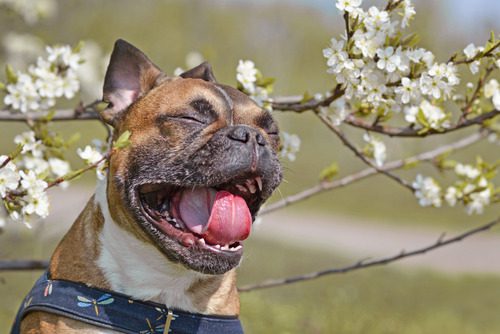Reverse Sneezing in Dogs: What it is and How to Help Your Pet
Have you ever heard your dog make a strange, honking sound that seems like a cross between a sneeze and a cough? It can be startling, but it’s likely a common occurrence known as reverse sneezing. At Limerick Veterinary Hospital, we’re here to help you understand what reverse sneezing is, why it happens, and when it might be time to seek professional advice. Our team is dedicated to providing you with the necessary information to ensure your dog’s health and happiness. For any concerns or questions, call us at (610) 489-2848 or book an appointment online.

What is Reverse Sneezing?
Reverse sneezing, also known as pharyngeal gag reflex, is a fairly common respiratory event in dogs. It’s characterized by a rapid and repeated forced inhalation through the nose, accompanied by snorting or gagging sounds. This can be startling, but it’s generally harmless. The cause of reverse sneezing is irritation or inflammation of the nasal, pharyngeal, or sinus passages. Small breeds and brachycephalic breeds (dogs with short noses and flat faces, like Pugs and Bulldogs) are more prone to this. While it’s typically not a cause for concern, understanding what triggers this reaction in your dog can help in managing the situation effectively.
Recognizing Reverse Sneezing Episodes
A reverse sneezing episode can be quite distinctive. You might notice your dog standing still with its elbows spread apart, head extended, and eyes bulging as it makes loud, dramatic snorting sounds. These episodes can last from a few seconds to a minute. The key to differentiating reverse sneezing from other respiratory issues is the sound and posture of your dog. Understanding this can reassure you that what you’re witnessing is a common occurrence and not an emergency. However, if you’re unsure or if these episodes become frequent, it’s best to consult with us for peace of mind.
Causes of Reverse Sneezing
Various factors can trigger a reverse sneezing episode in dogs. Common irritants include:
- Dust
- Perfumes
- Pollen or other environmental allergens
- Excitement or pulling on a leash
- Rapid drinking or eating
In some cases, underlying health conditions like nasal mites, respiratory infections, or anatomical abnormalities might be the cause. It’s important to observe when these episodes occur to identify possible triggers. If you’re concerned about the frequency or severity of your dog’s reverse sneezing, our team at Limerick Veterinary Hospital is here to help. Give us a call or schedule an appointment online for a thorough evaluation.
When to Consult a Veterinarian
While reverse sneezing is generally not harmful, there are times when it’s advisable to consult a veterinarian. If your dog’s reverse sneezing episodes are frequent, prolonged, or accompanied by other symptoms like nasal discharge, bleeding, or difficulty breathing, it’s important to seek professional advice. These could be signs of more serious conditions that require medical attention. At Limerick Veterinary Hospital, we prioritize your pet’s health and are equipped to diagnose and address any concerns you may have. Contact us at (610) 489-2848 or book an appointment online to ensure your dog’s well-being.
Managing Mild Episodes at Home
During a mild reverse sneezing episode, you can help your dog by staying calm and gently stroking its neck. This can sometimes shorten the episode by encouraging your dog to swallow, which helps to clear whatever is irritating the throat. You can also try gently massaging the throat area or covering the nostrils briefly, which can prompt your dog to swallow and potentially stop the reverse sneezing. Remember, these are only for mild cases and should not replace professional advice if you’re concerned.
Preventing Reverse Sneezing
Preventing reverse sneezing involves minimizing exposure to the triggers. Keep your home clean and free of dust and allergens, and consider using air purifiers. For dogs prone to excitement-induced episodes, try to maintain a calm environment. Additionally, using a harness instead of a collar can reduce pressure on your dog’s throat. Regular check-ups at Limerick Veterinary Hospital can also help in identifying and managing any underlying conditions contributing to reverse sneezing. Prevention is always better than cure, and we’re here to guide you in keeping your dog healthy and happy.
Importance of Regular Check-Ups
Regular veterinary check-ups are vital in monitoring your dog’s overall health and identifying any potential issues early. During these visits, we can assess your dog’s respiratory health and provide guidance on managing reverse sneezing. Your proactive approach to your pet’s health can make a significant difference in their quality of life.
Limerick Veterinary Hospital: Your Partner in Pet Health
At Limerick Veterinary Hospital, we understand how important your dog’s health is to you. Reverse sneezing can be a peculiar but typically harmless condition. However, if you ever have concerns about your pet’s health, we’re here to assist. Feel free to reach out at (610) 489-2848 or book an appointment online for any questions or to schedule a check-up. Together, we can ensure the best care for your beloved pet.
